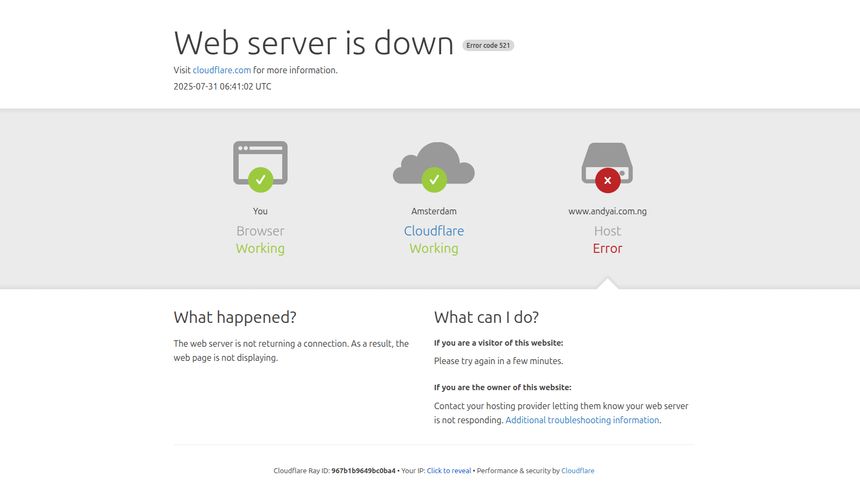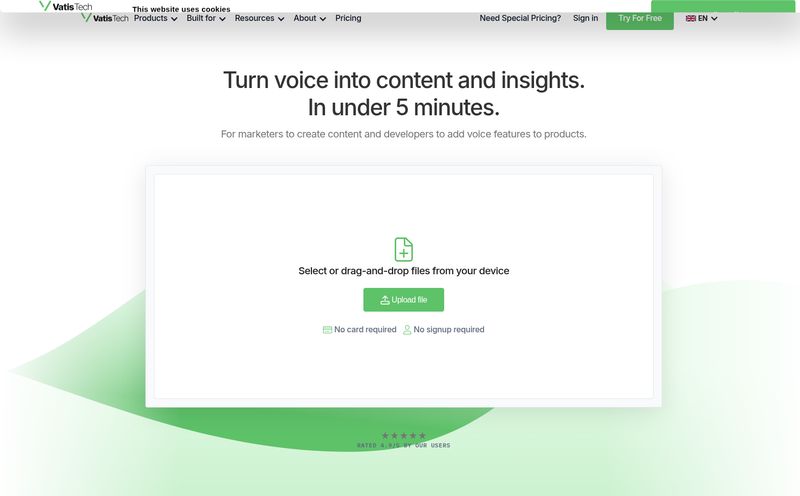If you're a book lover, you have one. It might be a physical stack of hardcovers teetering precariously on your nightstand, or it could be a digital list on Goodreads that's scrolling into infinity. I'm talking about the "To Be Read" pile. Mine has officially reached a point where it's less of a list and more of a legacy I'll be passing down to my children. It's a beautiful problem to have, but a problem nonetheless.
Every week, I hear about another must-read business book, a groundbreaking sci-fi novel, or a biography that's supposedly going to change my life. I want to read them all! But time, that cruel master, is always in short supply. So when I started seeing AI tools pop up promising to fix this very first-world problem, my inner SEO-nerd and my tired bookworm-self both sat up and paid attention. The latest one to cross my desk is BooksAI, a platform that claims to use the magic of OpenAI to give you book summaries and recommendations on demand.
But can an algorithm truly capture the soul of a story? Or is it just a high-tech version of reading the back cover? I had to find out.
So, What's the Deal with BooksAI?
At its core, BooksAI is pretty straightforward. It’s an application, available on mobile, designed to be your pocket-sized literary assistant. It uses a combination of AI technologies—specifically mentioning Vision AI and OpenAI—to do two main things: summarize books and suggest new ones for you to read.
The OpenAI part is what most people in the tech space will recognize. It's the powerhouse behind tools like ChatGPT, known for its ability to understand and generate human-like text. The Vision AI component is interesting; I'd guess it's used to let you, say, snap a picture of a book cover at a friend's house or in a bookstore and get an instant summary. A pretty slick feature if you're out and about. The whole idea is to get you the core information of a book in minutes, not hours.

Visit BooksAI
Putting The Features to the Test
A tool is only as good as its features, right? I spent some time playing around with what BooksAI has to offer. Here's how it went down.
The AI-Generated Summaries: The Main Event
This is the headline act. You look up a book, and the AI spits out a summary. I tried it with a few books I know well, from classic fiction to some dense non-fiction marketing tomes. The results were... pretty much what I expected. The summaries were fast, clear, and accurate in terms of plot points and main arguments. It successfully pulled out the key takeaways from a business book and traced the main character's arc in a novel.
But here's the thing. It’s like getting the movie trailer instead of watching the full film. You get the gist, the main beats, maybe even a hint of the big twist, but you miss the... texture. The author's unique voice, the beautiful prose, the subtext that makes a story resonate. For quickly deciding if a book's topic interests you, it's fantastic. For experiencing the book? Not a chance. It’s a tool for triage, not for replacement.
Personalized Book Recommendations… Or Are They?
The next big promise is personalized recommendations. The app lets you save books to a favorites list, which I assume feeds the algorithm to learn your tastes. This is standard practice for any recommendation engine, from Netflix to Amazon.
One feature I found interesting was the "Celebrity Book Lists." You can see what folks like Bill Gates or Oprah are reading. It's a smart bit of social proof and a great way to discover books you might not have otherwise considered. However, it does make me wonder how much of the recommendation is truly personalized versus just pointing you toward popular, curated lists. It’s a good feature, for sure, but maybe not the deeply intuitive, mind-reading AI librarian some might be hoping for.
More Than Just English: The Language Support
Now this is a feature that genuinely impressed me. BooksAI offers its summaries in multiple languages. In our increasingly connected world, this is a huge win. It's not just about convenience for non-English speakers; it’s about accessibility to ideas. Imagine being able to get the gist of a popular business book that hasn't been officially translated into your native language yet. That's powerful stuff. It breaks down barriers and democratizes information, which is something I can always get behind.
The Good, The Bad, and The AI-Generated
Alright, let's break it all down. No tool is perfect, especially one relying on the still-developing world of generative AI.
On the plus side, the convenience is undeniable. The ability to get a quick, digestible summary of a book in seconds is a game-changer for busy people. Students needing a quick refresher, professionals vetting a new book in their field, or just curious readers wanting to sound smart at their next dinner party—there's a clear audience here. The mobile app makes it easy to use on the go, and the multi-language support is a massive bonus.
However, we have to talk about the downsides. My biggest hang-up is the potential for AI inaccuracies. I’ve seen it happen with other tools. I once asked an AI for a summary of a niche marketing book, and it confidently invented a chapter that just... didn't exist. It's a reminder that these tools are powerful but not infallible. You have to take the summaries with a grain of salt. The other major con is that inherent lack of depth. An AI summary can't capture nuance, irony, or the emotional weight of a narrative. It gives you the what, but not the why or the how.
What's the Damage? A Look at BooksAI Pricing
So, what does all this AI goodness cost? Here's where things get a bit mysterious. After looking around, I couldn't find any clear pricing information. The official website, booksai.app, doesn't seem to have a public pricing page at the moment.
This isn't uncommon for new apps still in a growth phase. They might be operating on a free model to build a user base, or perhaps there's a freemium structure where you get a few free summaries before being asked to subscribe. My educated guess would be a future subscription model, maybe a few bucks a month. But for now, the lack of transparency is a bit of a question mark. It's something to keep in mind if you're thinking of making it a core part of your reading workflow.
Who Is This Tool Really For?
After kicking the tires, I've got a pretty good idea of who will love BooksAI and who will probably pass.
- The Time-Crunched Professional: Absolutely. If you need to know the top 3 takeaways from "The 7 Habits of Highly Effective People" before a meeting, this is your secret weapon.
- The Overwhelmed Student: Yes. It's a great study aid for getting a high-level overview of a dense text before you dive in (or, let's be honest, before an exam).
- The Curious Browser: For sure. If you love discovering new books but are plagued by indecision, a quick summary can be the perfect tie-breaker.
- The Literary Purist: Probably not. If you believe the journey of reading is the destination, then a shortcut like this will likely feel like sacrilege. And that's perfectly fine.
Your Burning Questions Answered
- How does BooksAI generate its book summaries?
- It uses artificial intelligence, specifically OpenAI's language models, to read and condense the main points of a book into a short summary. It likely also uses Vision AI to recognize book covers.
- Is BooksAI free to use?
- Currently, the pricing isn't clear. It may be operating on a free model or a freemium tier, but the company hasn't published a clear pricing plan. It's best to download the app and see for yourself.
- Can I trust the AI summaries to be 100% accurate?
- I wouldn't. While generally good for getting the main idea, AI can sometimes make mistakes, misinterpret nuance, or even invent details. Think of them as a very knowledgeable but not infallible guide.
- Is BooksAI better than just reading reviews on Goodreads?
- They serve different purposes. BooksAI gives you a factual, plot-based summary. Goodreads gives you subjective opinions and reactions from other readers. I'd use BooksAI to understand what a book is about and Goodreads to see if people liked it.
- What languages does BooksAI support?
- The platform supports multiple languages, which is a major advantage for global users, though a specific list of supported languages isn't readily available.
- Can I use BooksAI on my phone?
- Yes, a key feature is its availability as a mobile app, making it convenient to use anywhere.
So, Should You Add BooksAI to Your Digital Bookshelf?
Here's my final take. BooksAI is a genuinely useful tool for a specific purpose: information triage. It's a clever and efficient way to manage the endless firehose of new books and decide where to invest your precious reading time. It won't replace the magic of getting lost in a great book for a weekend, nor should it.
It's a supplement, not a substitute. It’s for the pragmatist in all of us who just needs to know if a book is worth the commitment. For that, it’s a powerful ally in the battle against the ever-growing TBR pile. Will I use it? Yes, absolutely. But I'll be using it to decide which book to curl up with next, not to avoid the reading itself. And for me, that's a perfect compromise.
Reference and Sources
- Official Website: BooksAI (booksai.app)
- AI Technology Provider: OpenAI
- Further Reading on AI's role in creative fields: WIRED - What Is Generative AI?



